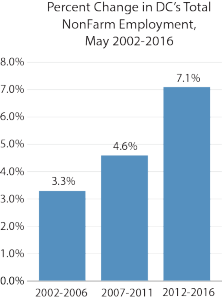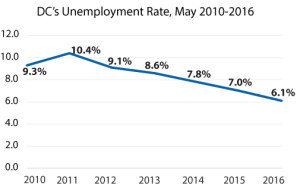DC’s economy is very strong, with the number of jobs growing and the unemployment rate falling every year since the Great Recession. This recent good news of continuing robust growth suggests that DC’s economy can absorb policies to help and protect workers, including the minimum wage increase and proposals now before the Council to establish paid family leave and to improve scheduling practices for retail and restaurant workers. These steps are important to help workers without a college education, who have not benefited fully from DC’s growing economy and still face challenges such as low wages and high rates of part-time work.
On Friday, the U.S. Bureau of Labor Statistics released its monthly employment and unemployment numbers, and found that the District saw significant improvements all around:
- Unemployment is down. The District’s overall unemployment rate is down to 6.1 percent. This marks a 0.3 percent decrease in the last month, and a 0.9 percent decrease since May of last year.
- Employment is up. Employment in the District reached 784,700 jobs, which is an increase of 6,800 jobs since April, and 17,700 jobs in the last year.
Moreover, DC has seen consistent job growth and unemployment declines each year since the Great Recession ended in 2010, including over 7 percent job growth between 2012 and 2016. See Figures 1 and 2.
However, just because employment opportunities are growing in the District, that doesn’t mean that these jobs provide sufficient benefits and protections in an increasingly expensive city. Wages have fallen for DC residents with a high school degree — who typically earned just $13 an hour in 2014 — and nearly one-third were underemployed, meaning they were out of work or working part-time despite wanting more hours. Moreover, the poorest fifth of DC’s households have actually seen their incomes decline since the recession ended.
More needs to be done to ensure that all workers can afford to make ends meet. Three bills currently under consideration at the Council would be hugely beneficial to District workers:
- The Hours and Scheduling Stability Act of 2015 would require retail and restaurant employers to offer additional hours to current employees first, before they look for a new hire. It also would ensure that employees get advance notice of their schedules.
- The Universal Paid Leave Act of 2015 would provide up to 12 weeks of paid leave for workers in DC to care for themselves, a new child, or an ill family member.
- Proposed changes to the Budget Support Act would ensure a more robust indexing inflation for Unemployment Insurance benefits. Specifically, the provision would require automatic inflation adjustments each year, unless there is evidence that such an increase will cause a near- or long-term solvency problem for the UI Trust Fund. This will ensure that workers who lose their job receive adequate unemployment benefits, both now and in the future.
The Council should act quickly to pass these important bills before the summer recess to ensure that once workers get a job, they have the protections they need to provide for their families.
To print a copy of today’s blog, click here.
